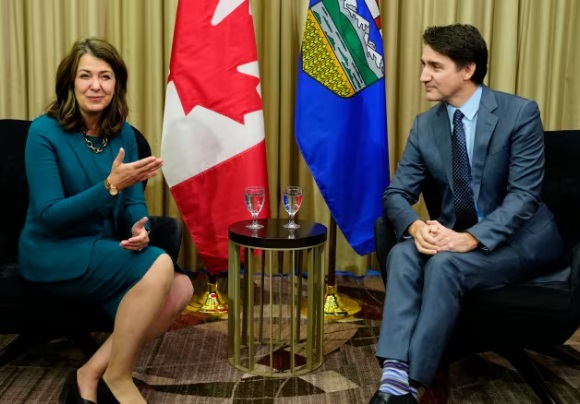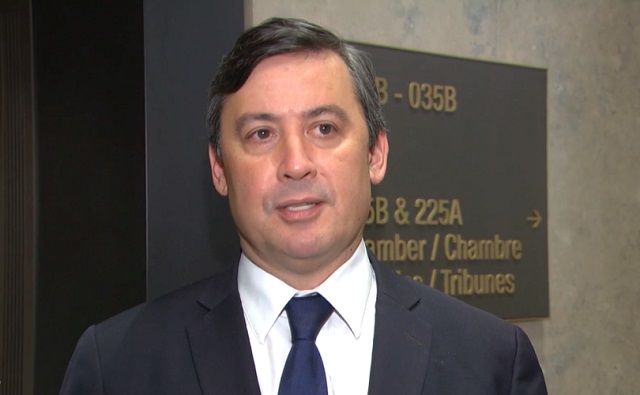Alberta
Taking Action Against Climate Change with Emissions Reduction Alberta

As the climate conversation continues to expand in the public space, ambitious goals for reducing emissions are being communicated at regional and international levels. The burning of fossil fuels has substantially contributed to the build up of greenhouse gases (GHG) in our atmosphere, resulting in the climate changes currently impacting major industries, ecosystems, weather patterns, natural resources and biodiversity around the world. According to Climate Change in Alberta, “97% of climate scientists now agree that human activity is responsible for most temperature increases over the past 250 years.”
In Alberta, over 50% of GHG emissions are the result of “industrial, manufacturing and construction activity, as well as producing the electricity we consume … the remainder comes from heating our homes and businesses, transportation and from agriculture, forestry and municipal waste” (1). As a part of a multi-level provincial strategy aimed at reducing greenhouse gas emissions in Alberta, the government currently partners with various organizations and funds a number of programs designed to accelerate emissions reduction initiatives and technology development.
One Alberta organization that has played a significant role in furthering emissions reduction in our province for more than a decade is Emissions Reduction Alberta (ERA), based in Edmonton.
Established in 2009, Emissions Reduction Alberta “takes action on climate change and supports economic growth by investing in the pilot, demonstration and deployment of clean technology solutions that reduce GHGs, lower costs and attract investment, and create jobs in Alberta.” For more than 10 years, ERA has been facilitating Alberta’s transition to a low carbon economy by supporting and furthering the most innovative approaches to emissions reduction.
“Alberta’s industries have ambitious goals around emissions reductions that can’t be achieved without deploying new technology,” says Steve MacDonald, CEO of Emissions Reduction Alberta, “Our goal is to identify and accelerate the innovation Alberta needs to grow the economy and cut emissions.”

Steve MacDonald – CEO of Emissions Reduction Alberta
ERA’s funding comes from the carbon price paid by large final emitters in Alberta. With this funding, ERA operates a challenge structure that calls innovative companies to respond to pertinent industry challenges with original solutions. “Challenges are always well over-subscribed,” says MacDonald. “This gives us the ability to really select the best of the best and get a good understanding of the range of ideas that are out there.”
To date, ERA has invested $607 million in the development of 183 unique projects dedicated to reducing emissions across various industries. ERA funding is leveraged and for every dollar invested by the organization, another $6.40 is invested by industry, innovators and other project funders. As a result, the total value of these projects is over $4 billion. ERA estimates this will lead to a total reduction of 34,800,000 tonnes of CO2e by the year 2030.
In October 2019, ERA announced their Natural Gas Challenge, a campaign committed to improving cost competitiveness and reducing emissions in Alberta’s natural gas sector. On July 21, 2020, ERA pledged $58.4 million to the 20 winning projects, valued at over $155 million. According to ERA, these projects will create 760 new jobs and, “if successful, these technology innovations will lead to cumulative GHG reductions of almost one million tonnes of CO2e by 2030 – equivalent to the GHG emissions from 750,000 passenger vehicles driven for one year.”
Moving forward, the ERA expects to see the first round of Expression of Interest for their latest $40 million Food, Farming and Forestry Challenge by August 27, 2020. In the meantime, the organization will continue to focus on aiding Alberta’s economic recovery through diversification and job creation, and the pursuit of innovation.
“We are supporting the actions required to help Alberta achieve its economic and environmental goals,” says MacDonald. “Our investments are making a real difference; one that is fundamental to Alberta’s future success. From incremental change to game-changers, we are developing the solutions Alberta and the world need.”
To learn more about Emissions Reduction Alberta, visit https://eralberta.ca.
For more stories, visit Todayville Calgary.
Alberta
Danielle Smith warns arsonists who start wildfires in Alberta that they will be held accountable

From LifeSiteNews
The Alberta government has created an ad campaign highlighting the fact that most fires are caused by humans and not ‘climate change,’ as many left-leaning politicians claim.
In preparation for the so-called wildfire “season,” Alberta Premier Danielle Smith sternly warned anyone caught starting blazes in her province, including arsonists, that they will face charges and be held fully “liable” for all costs associated with the fires.
“As we approach the wildfire season, it is important to understand that 67% of wildfires in Alberta are started by people,” Smith posted Monday on X.
“If you start a wildfire, you can be charged, fined, and held liable for all costs associated with fighting the wildfire.”
Smith made the comments after last year revealing that most of the wildfires in her province (500 of the 650) were caused by humans and not “climate change,” as has been pushed by the legacy media and opposition politicians.
“All I know is in my province we have 650 fires and 500 of them were human caused,” she said, “so we have to make sure that when people know that when it’s dry out there and we get into forest fire season that they’re being a lot more careful because anytime you end up with an ignition that happens it can have devastating consequences.”
To go along with Smith’s Monday message, the Alberta government has also created an ad campaign highlighting the fact that most fires are caused by humans and not “climate change,” as many left-leaning politicians claim.
As reported by LifeSiteNews last year, Smith ordered arson investigators to look into why some of the wildfires that raged across the vast expanse of the province had “no known cause” shortly after they spread.
During the campaign of Alberta’s 2023 election, Smith, whose United Conservative Party won a majority government, had to pause to deal with many wildfires that suddenly, out of nowhere, ravaged the province. The fires came on suddenly and uncharacteristically considering the heavy snowfall in the province in early March and rain in April.
LifeSiteNews reported that despite the arrest of multiple arsonists, Canada’s mainstream media and the federal government have been pushing a narrative attributing the recent wildfires to “climate change.”
Indeed, in January, LifeSiteNews reported that a man from Quebec admitted to starting 14 forest fires himself. This put a chill to the legacy media’s push that the fires in the province were caused by “climate change.”
However, statistics from Canada’s National Fire Database show that wildfires have gone down in recent years and peaked in 1989.
As for Canadian Prime Minister Justin Trudeau, he has repeatedly used “climate change” and forest fires as a catalyst for propping up his government’s much-maligned carbon tax, which Smith opposes. He has blamed the fires on “climate change.”
A June 2017 peer-reviewed study by two scientists and a veteran statistician confirmed that most of the recent global warming data have been “fabricated by climate scientists to make it look more frightening.”
Trudeau has been calling for increased bans on Canada’s natural resources, of which Alberta has in abundance.
Smith has vowed to fight Trudeau on his attacks against Alberta’s oil and gas industry.
The reduction and eventual elimination of so-called “fossil fuels” and a transition to unreliable “green” energy has also been pushed by the World Economic Forum (WEF), the globalist group behind the socialist “Great Reset” agenda in which Trudeau and some of his cabinet are involved.
Alberta
Free Alberta Strategy backing Smith’s Provincial Priorities Act

News release from Free Alberta Strategy
Premier Danielle Smith had a message for Ottawa last week.
Keep out.
On Wednesday, the Premier rolled out her latest weapon in the fight against federal intrusions into provincial jurisdiction.
If passed, Bill 18 – the Provincial Priorities Act – aims to align federal funding with provincial priorities, ensuring that said funding reflects Alberta’s interests.
The legislation stipulates that any agreements between the federal government and any provincial entities – including municipalities – must receive provincial approval to be considered valid.
Smith has already given it a nickname: “the stay-out-of-my-backyard bill.”
It’s an apt description of the legislation, especially considering that’s what the federal government has been doing for years – encroaching into Alberta’s jurisdiction.
The legislation shouldn’t come as a surprise to anyone.
We all know that most deals the Alberta government enters into with the federal government don’t work out for Albertans.
We end up paying more in federal taxes than gets spent in federal spending on the programs.
The programs come laden with restrictive conditions that undermine our autonomy, and are often detrimental to our ability to provide the services.
This is especially true with regard to the recent agreement between Ottawa and the provinces that allows the federal government to nationalize childcare.
The childcare agreement has come under heavy criticism due to funding shortfalls in the deal.
It also applies to housing, where despite Alberta accounting for 12% of the national population and experiencing the most rapid population growth, it received a mere 2.5% of the total $1.5 billion in federal housing funding last summer.
Jason Nixon, Minister of Seniors, Community and Social Services, is in charge of housing in Alberta – which is provincial jurisdiction.
On the latest rollout of conditional federal housing handouts, Nixon isn’t buying.
“We will not be bribed, with our own money, to increase the time it takes to get homes built with green energy that makes homes more expensive.”
The theory also applies to the federal government’s latest gambit – doing an end-around provincial negotiations and going directly to municipalities, who seem more interested in taking the money than the conditions attached.
Municipalities are provincial jurisdiction.
Bill 18 mandates that entities within Alberta’s jurisdiction, such as municipalities, universities, school boards, housing agencies, and health authorities, must seek the province’s approval before engaging in, modifying, extending, or renewing agreements with Ottawa.
Agreements between the federal government and provincial entities lacking Alberta’s endorsement will be deemed illegal under this legislation.
That’s Premier Smith’s message.
She’s had enough of it.
“It is not unreasonable for Alberta to demand fairness from Ottawa. They have shown time and again that they will put ideology before practicality, which hurts Alberta families and our economy. We are not going to apologize for continuing to stand up for Albertans so we get the best deal possible.
“Since Ottawa refuses to acknowledge the negative impacts of its overreach, even after losing battles at the Federal and Supreme Courts, we are putting in additional measures to protect our provincial jurisdiction to ensure our province receives our fair share of federal tax dollars and that those dollars are spent on the priorities of Albertans.”
Municipal Affairs Minister Ric McIver had additional thoughts:
“For years, the federal government has been imposing its agenda on Alberta taxpayers through direct funding agreements with cities and other provincial organizations. Not only does Alberta not receive its per capita share of federal taxpayer dollars, the money we do receive is often directed towards initiatives that don’t align with Albertan’s priorities.
“Albertans from all corners of the province expect our federal share of taxes for roads, infrastructure, housing and other priorities – not federal government political pet projects and programs in select communities.”
The Provincial Priorities Act is based on existing provincial legislation in Quebec – called “An Act Respecting the Ministère du Conseil executif” – which prohibits any municipal body from entering into or negotiating an agreement with the federal government or its agencies without express authorization from the Quebec government.
That’s right – the Quebec government has the same rule!
So, this boils down to the same argument we’ve been making for years – if Ottawa wants to step into our backyard, it must first seek Alberta’s approval.
Enough is enough – we won’t stand idly by as our interests are trampled upon.
It’s time for Ottawa to recognize Alberta’s autonomy and respect our right to determine our own future.
At the Free Alberta Strategy, we know that constant vigilance is necessary – for every fence we put up, the federal government tries to find a way around it.
We’ll continue to bring you information about what’s happening in Alberta’s backyard and fighting to keep Ottawa out.
The Free Alberta Strategy Team
-

 Jordan Peterson2 days ago
Jordan Peterson2 days agoJordan Peterson slams CBC for only interviewing pro-LGBT doctors about UK report on child ‘sex changes’
-

 Addictions2 days ago
Addictions2 days agoLiberal MP blasts Trudeau-backed ‘safe supply’ drug programs, linking them to ‘chaos’ in cities
-

 International2 days ago
International2 days agoBrussels NatCon conference will continue freely after court overturns police barricade
-

 International18 hours ago
International18 hours agoTelegram founder tells Tucker Carlson that US intel agents tried to spy on user messages
-

 Agriculture2 days ago
Agriculture2 days agoBill C-282, now in the Senate, risks holding back other economic sectors and further burdening consumers
-

 Business19 hours ago
Business19 hours agoNew capital gains hike won’t work as claimed but will harm the economy
-

 Alberta1 day ago
Alberta1 day agoDanielle Smith warns arsonists who start wildfires in Alberta that they will be held accountable
-

 Bruce Dowbiggin17 hours ago
Bruce Dowbiggin17 hours agoWhy Are Canadian Mayors So Far Left And Out Of Touch?







